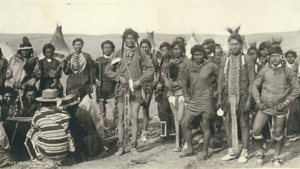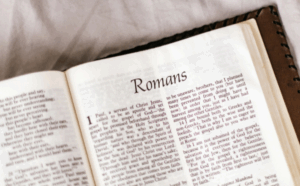Years ago, I joined a Bible study group that meets weekly at a local coffee shop. This group, which includes participants of various ages, had been reading Scripture together long before I joined. Both before and after my arrival, the cohort has been a steadfast reflection of faith and friendship. Even as a relative latecomer, the relationships that I have forged through conversation and interpretation (and, sometimes, disagreement) around the biblical text have been ongoing for nearly a decade.
Over the years, our assembly has undergone some major changes: friends or neighbors have joined for various amounts of time; longtime members have relocated; and, sadly, some have passed away. There have been fluctuations of the meeting venue, open questions about the direction and goals of the group, and even times of extended hiatus. Through all this variation, our aspirations and identity have held together thanks to a single constant: the conviction that the God of the Bible remains at the center of our gatherings and galvanizes us to grow in faith.
Still, it is not always easy for us to maintain a sense of cohesion in the midst of change. The instability and variability of our experiences can make it difficult to stay focused on those relationships that truly matter—and to keep moving forward in peace and hope when some relationships dissolve. How might the biblical text offer us ways to foster fellowship within communities whose consistency and stability can be outside of our control?
Take, for instance, 1 Chronicles; specifically, in the book’s portrayal of “all Israel” as an identifiable group under God that endures throughout biblical and post biblical history. The books of 1 & 2 Chronicles refer to “all Israel” more than forty times, and the expression indicates members of a particular ethnic group whose hereditary bonds and association with the Most High God tie them together. Yet, this shared history and experience does not mean that “all Israel” remains perfectly stable over space and time.
The first instance of the expression in 1 Chronicles appears at the end of seven chapters of genealogies that begin with “the sons of Israel” (1 Chronicles 2:1 New Revised Standard Version updated edition). After listing the members of the tribe of BenjaminA son of Jacob and tribe of Israel. More, the Chronicler states, “So all Israel was enrolled by genealogies, and these are written in the Book of the Kings of Israel” (1 Chronicles 9:1a). Yet, the very next verse recounts the dispersion of JudahJudah was the name of Jacob's fourth son and one of the 12 tribes. More, the southern kingdomThe Southern Kingdom consisted of two tribes of Israel, Judah and Benjamin. Jerusalem was its capital, and the kingdom lasted from 931-586 B.C.E. As with the Northern Kingdom many of the kings were wicked, and prophets like Isaiah, Jeremiah, and Ezekiel spoke their often judgmental... More of Israel: “And Judah was taken into exile in Babylon because of their unfaithfulness” (9:1b).
Refusing to dwell on this catastrophic exilic event, the Chronicler moves immediately to the historic return from Babylon: “Now the first to live again in their possessions in their towns were Israelites (Hebrew: “Israel”), priests, Levites, and templeThe Jerusalem temple, unlike the tabernacle, was a permanent structure, although (like the tabernacle) it was a place of worship and religious activity. On one occasion Jesus felt such activity was unacceptable and, as reported in all four Gospels, drove from the temple those engaged... More servants. And some of the people of Judah, Benjamin, Ephraim, and Manasseh lived in Jerusalem” (1 Chronicles 9:2-3). In this way, readers of 1 Chronicles get a three-sentence overview of hereditary Israel, the diasporic division therein, and the restoration of the exiles back to their land.
There’s a lesson for modern believers in this very brief summary of Israel’s history: the Chronicler is convinced that nothing—not even national exile—can destroy the cohesion of God’s people. In concert with 1 Chronicles, the book of DanielAn interpreter of dreams who was delivered from the lions' den. More (another post-exilic text) has Daniel address his “great and awesome God,” (Daniel 9:4) and declare that “all Israel [consists of] those who are near and those who are far away” (Daniel 9:7). Whatever the loss or separation that Israel suffers, Scripture portrays covenantal relationship with God as the true source of its unity.
As Paul would put it many years later, “Who will separate us from the love of Christ? Will affliction or distress or persecution or famine or nakedness or peril or sword? […] No, in all these things we are more than victorious through him who loved us. I am convinced that neither death, nor life, nor angels, nor rulers, nor things present, nor things to come, nor powers, nor height, nor depth, nor anything else in all creationCreation, in biblical terms, is the universe as we know or perceive it. Genesis says that in the beginning God created the heavens and the earth. In the book of Revelation (which speaks of end times) the author declares that God created all things and... More will be able to separate us from the love of God in Christ JesusJesus is the Messiah whose life, death, and resurrection are God's saving act for humanity. More our Lord” (Romans 8:38-39).
With the biblical story of exile and return in mind, the Chronicler takes the reader on a retrospective journey through Israel’s prior history, when God’s people had lived under king DavidSecond king of Israel, David united the northern and southern kingdoms. More. In 1 Chronicles 11 we read, “all Israel gathered together to David at Hebron and said, ‘Look, we are your bone and flesh … The Lord your God said to you, ‘It is you who shall be shepherd of my people Israel, you who shall be ruler over my people Israel’” (11:1-2).
Not only does the Chronicler explicate the incarnate relationship between David and Israel—the people being the king’s “bone and flesh”—but the author also ratifies Davidic leadership with reference to God choosing David to lead the “people Israel.” Though 1 Chronicles was written many centuries after “all Israel” rallied around David, the text makes a concrete connection between Israel’s past and the postexilic present of its author’s day.
The Chronicler’s description of David as Israel’s shepherd will be familiar to readers of Matthew’s Gospel, which alludes to Chronicles when the chief priests and scribes refer to the biblical prophecyProphecy is the gift, inspired by God, of speaking and interpreting the divine will. Prophets such as Amos, Isaiah, and Ezekiel spoke words of judgment and comfort to the people of Israel on behalf of God. More that the Bethlehemite MessiahThe Messiah was the one who, it was believed, would come to free the people of Israel from bondage and exile. In Jewish thought the Messiah is the anticipated one who will come, as prophesied by Isaiah. In Christian thought Jesus of Nazareth is identified... More will be “a ruler who is to shepherd my people Israel” (MatthewA tax collector who became one of Jesus' 12 disciples. More 2:6). For Matthew, Jesus “son of David” (1:1) is the fulfillment of God’s care for the same “Israel” that existed in the days of David and the Chronicler. The Old Testament provides the Gospel writer with the basis for identifying first-century Israel as the recipients of God’s promises to the Israel of Davidic times. PaulThe Apostle Paul, originally known as Saul of Tarsus, was the author of several New Testament letters and the founder of many Christian communities. More also draws on the Chronicler’s catchphrase to express his conviction about his fellow “Israelites” (Romans 9:4) when he asserts that “all Israel will be saved” (Romans 11:26).
Just as it did for Matthew and Paul, 1 Chronicles can provide a blueprint for those who continue to gather in the pursuit of God today. Whether near or far, at home or away, Bible readers can participate in an ongoing divine story—one that follows the historical iterations of Israel and reverberates among the many peoples of faith in the present. The Chronicler’s chorus of “all Israel” can serve as a constant reminder of the spiritual stability and collective consolation for those who trust in the faithfulness of God.




